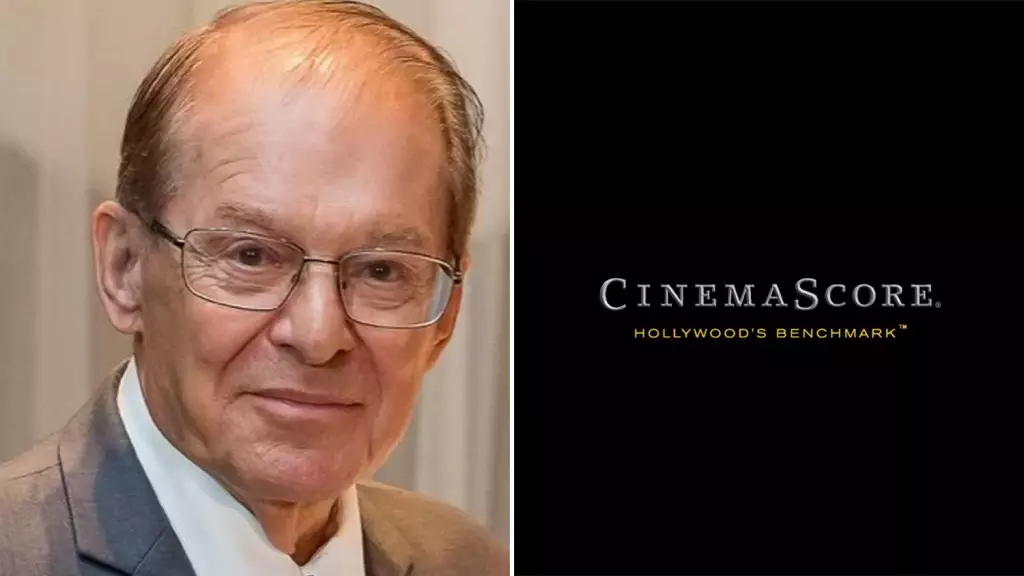The film industry has lost a visionary with the passing of Ed Mintz, the founder of CinemaScore, on February 6 at the age of 83. Mintz’s groundbreaking audience polling service, equipped with the mathematical “Coca-Cola” algorithm, has been celebrated by studios and exhibitors alike since its establishment in the early 1980s. Not only has CinemaScore served as a domestic box office barometer, but it has also become a vital resource for gauging audience reception on a film’s opening night. Mintz’s legacy lives on through CinemaScore, which continues to be operated by his two sons, Harold and Ricky Mintz.
Intriguingly, the genesis of CinemaScore can be traced back to a disappointing movie outing experienced by Mintz in 1978. He and his wife, accompanied by another couple, eagerly went to see “The Cheap Detective,” directed by Robert Moore and written by Neil Simon. As a fan of Simon’s work, Mintz had high hopes for the film, influenced by an overly positive review. However, the movie fell significantly short of his expectations, leaving him disillusioned. Mintz then questioned the credibility of film critics determining the worth of movies on behalf of all moviegoers. This pondering led to a revelation: why not gather opinions from a larger audience to provide a more accurate assessment of a film’s value? Thus, the concept of CinemaScore was born.
Soon after his realization, Mintz attended high-holiday Jewish services in a temple, where he received a pledge card with easy-to-tear perforations. This card served as inspiration for CinemaScore’s distinctive audience polling ballot. Simultaneously, Mintz diligently developed the “super sauce” algorithm, a method that has remained central to CinemaScore’s approach and has established it as a respected voice in evaluating a movie’s overall success.
CinemaScore swiftly garnered attention from the film industry, transforming it into an indispensable tool for filmmakers and distributors. Rob Moore, the former Vice Chairman of Paramount Pictures, acknowledged its significance by stating, “When social media started providing nearly infinite and often conflicting information about audiences’ responses to the opening of a film, Ed managed to craft a tool that synthesized the data into a singular score that was invaluable in charting the course for the future of a movie’s campaign.” Mintz himself tirelessly traveled from Las Vegas, the headquarters of CinemaScore, to approach Hollywood studios and secure audience-service contracts. Often, he engaged in late-night discussions with distribution executives on a film’s opening night, where the merits of its CinemaScore grade were debated or embraced. The unvarnished truth displayed by both ticket sales and CinemaScore grades left no room for deception.
A Friend to Marketing Executives
Jeff Blake, the former Sony Global Distribution Chief, fondly recounts his experiences with Mintz, saying, “I loved contacting Ed for the CinemaScore on an opening night… If the grosses were good, you could add that ‘A’ and it gave a feeling of invulnerability. If grosses were less than expectations, the ‘A’ would give a feeling of hope. Either way, Ed was a marketing exec’s best friend on opening night.” Mintz’s contribution to the industry extended far beyond figures and data; it provided a sense of assurance and guidance for those responsible for a film’s marketing strategy.
In the mid-1980s, AMC Theatres became the first to recognize the potential of CinemaScore’s audience polling system. Mintz’s partnership with AMC demonstrated that CinemaScore could significantly influence which movies the theater chain chose to exhibit. Over time, CinemaScore’s reputation soared, reaching a pinnacle moment in 2018. Dwayne Johnson, a Hollywood superstar, met Mintz and showered him with praise, referring to him as an “icon.” This encounter served as a testament to Mintz’s immense impact on the film industry.
Beyond its role in gauging moviegoers’ reactions, CinemaScore found applications in various sectors. Mintz expanded the reach of his audience polling expertise by offering CinemaScore surveys to companies involved in the realm of product placement. Moreover, for nearly 25 years, he conducted research on behalf of Anheuser Busch, contributing to the success of the renowned brewing company. Las Vegas casinos even benefited from CinemaScore’s insights, utilizing it to inform decisions about slot machine additions on their floors. The versatility and adaptability of CinemaScore’s polling methods served as a testament to Mintz’s ingenuity and foresight.
Ed Mintz’s contributions to the film industry, particularly through the establishment of CinemaScore, have forever left an indelible mark. Jeff Goldstein, the Domestic Distribution Chief at Warner Bros., summarized Mintz’s impact succinctly, saying, “Ed will remain A+++ in the history books; he pioneered an essential global rating benchmark for the entertainment industry.” Beyond revolutionizing audience polling, Mintz exemplified the qualities of a pioneer and a visionary, leaving behind a rich legacy that continues to shape the film industry’s approach to evaluating audience reception.

